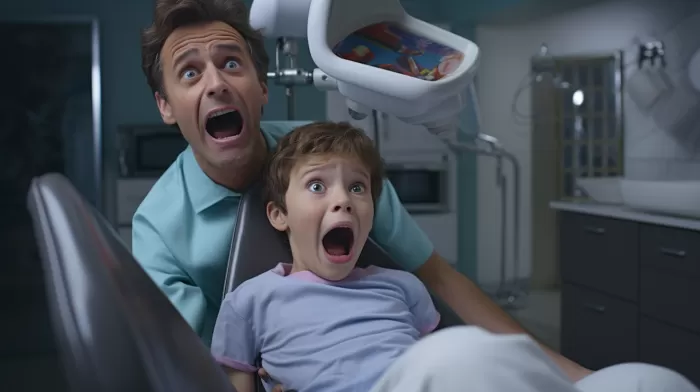Did you know that a good portion of our dental anxiety could be inherited from our parents? That’s right, folks! As it turns out, dental fear and anxiety typically trickle down the family tree, possibly impacting the way we, and our children, react to dentist visits.
In a study conducted by the Rey Juan Carlos University of Madrid, researchers found that the higher the level of dentist fear or anxiety in one family member, the higher the level in the rest of the family. They discovered that fathers, in particular, play a key role in transmitting dental anxiety from mothers to their children. So, let’s delve into this fascinating study and how we can better manage the dread that may come with our dental appointments—for both ourselves and our little ones.
The Connection Between Parents and Children’s Dental Anxiety
According to the Spanish study, children seem to be more sensitive to their father’s emotional reactions when determining if a situation at the dental office may be stressful. Researcher Lara Sacido reveals that although the results should be interpreted with some caution, there seems to be a strong correlation between family members’ reactions and the development of dental anxiety in children.
In a nutshell, it’s important for parents to be aware of their own reactions and emotions when visiting the dentist so that they may not inadvertently pass down this fear to their offspring.
The impact of dental anxiety
Dental anxiety can significantly harm a person’s oral health, as it can lead to the avoidance of dental treatments. Even simple procedures such as teeth cleaning or cavity fillings can become daunting. Dental anxiety can prevent people from seeking proper care, which may cause complications such as gum disease or tooth decay.
Dental anxiety can be mild or severe, and symptoms may include restlessness, intangible fear, increased heart rate, and uneven breathing patterns. It’s critical to recognize these symptoms and address the anxiety to ensure that it does not interfere with maintaining a good oral health routine.
Coping with dental anxiety
The good news is that dental anxiety can be managed and treated with various coping techniques. Here are some tried and tested ways to help you deal with dental anxiety for yourself and your children:
- Stay informed: Lack of knowledge about dental procedures can lead to heightened anxiety. By understanding the process, the fear of the unknown may be diminished. Ask your dentist to thoroughly explain each procedure before it begins and to update you on what’s happening during the process.
- Practice relaxation techniques: Whether it’s simple deep breaths, meditation, or progressive muscle relaxation, these techniques can help calm nerves and make you feel more relaxed during your visit.
-
Engage in distraction techniques: Keeping your mind occupied can help alleviate anxiety. Bring your favorite music or watch something on your phone to take your mind off of the procedure.
-
Establish a signal: Sometimes, you may need a break during a procedure. Discuss a specific hand signal with your dentist beforehand to signify when you need a pause.
-
Consider sedation dentistry: For more severe anxiety, opting for sedation dentistry can help. This involves the administration of medication to help patients feel more at ease during their dental visit.
Preventing the transmission of dental anxiety to children
Apart from the coping techniques mentioned above, here are some ways parents can help ensure their dental anxiety doesn’t pass on to their children:
- Be mindful of your emotions: Kids often pick up on non-verbal cues from their parents. Make an effort to maintain a positive attitude and be mindful of what you say and how you act around your children when discussing dental visits.
-
Introduce your child to the dentist early on: Bringing your child to the dentist from a young age can help them familiarize themselves with the environment, making it feel more comfortable and less intimidating.
-
Reinforce positive experiences: After each dental visit with your child, praise them for their bravery and remind them of the benefits of maintaining healthy teeth and gums.
In conclusion, the connection between family members and dental anxiety shouldn’t be underestimated. By being mindful of our own emotions, practicing coping techniques, and creating positive experiences for our children at the dental office, we can break the cycle of dental anxiety for generations to come.



